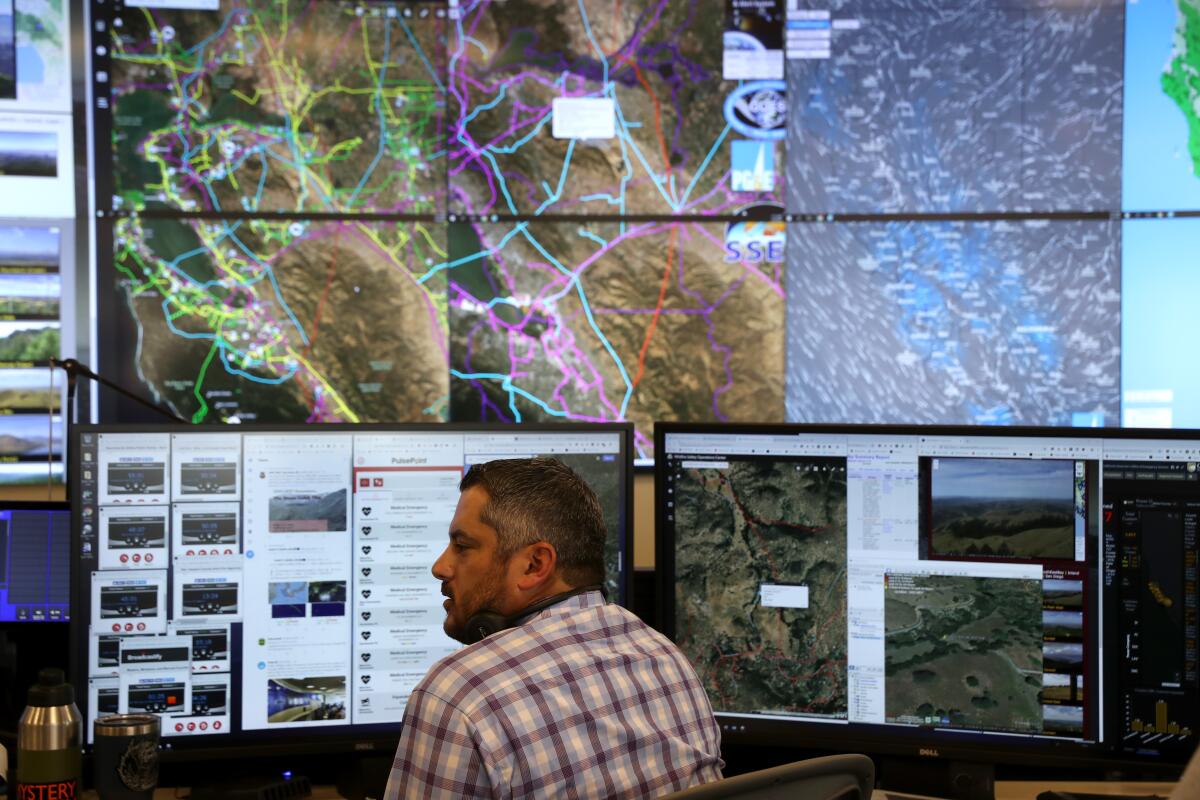California regulators open inquiry into PG&E power outages

- Share via
California regulators opened a formal investigation Wednesday into preemptive power outages that blacked out large parts of the state in October, drawing strong rebukes from public officials and residents who said the shut-offs were too broad and poorly executed.
The unanimous vote by the California Public Utilities Commission followed testimony from a handful of people who pleaded with the panel for leadership at a time of increased danger from fire and other natural disasters.
“Many Californians are debating whether California is still safe. Is this a safe place to live?” said Will Abrams of Santa Rosa, whose house burned down in 2017 in wildfires that roared through Northern California wine country.
The state’s largest utility, Pacific Gas & Electric Co., initiated multiple rounds of shut-offs and plunged nearly 2.5 million people into darkness at one point throughout Northern and Central California. Some of the outages lasted several days.
No gasoline. Generators in short supply. Spoiled food. Darkness. Hunger. In Lake County, thousands endured days of PG&E’s most recent power outages, aimed at protecting the public and limiting the utility’s wildfire liabilities.
PG&E officials insisted on the shut-offs for public safety. But infuriated residents and a parade of public officials, including Gov. Gavin Newsom, said that cutting off power should be done only as a last resort and that the company regularly botched communications.
Nevada City Mayor Reinette Senum said Wednesday that her rural community had no working phones or internet access. She wants local control over the power grid, which she said could take better care than PG&E, which is a for-profit utility.
“Basically, we were sent back into the dark ages,” she said.
Southern California Edison Co. and San Diego Gas & Electric Co. are also for-profit utilities that shut off power, but to far fewer people.
The outages raised concerns about whether the utilities “properly balanced the need to provide reliable service with public safety” and whether the actions “were properly planned and executed,” according to the order authorizing the investigation.
Commission President Marybel Batjer requested the broad investigation, saying widespread outages “cannot be the new normal for California.” Commissioners said Wednesday that they want to know what can be done to improve shut-offs or reduce their scope in the future.
Batjer also signed an order Tuesday directing PG&E to show why it should not be fined for other violations related to the shutdowns. Each violation of state requirements involving power shutdowns could carry a $100,000 penalty.
Bill Johnson, chief executive of the utility’s parent company, PG&E Corp., has said the outages kept people safe, although a transmission line in Sonoma County that was not powered off malfunctioned minutes before a wildfire erupted Oct. 23, forcing about 180,000 people to evacuate.
Utility spokesman Ari Vanrenen said again Wednesday that the shut-offs were the right call. He said the company continues to improve and has “made every effort” to implement the commission’s requirements when it cuts power.
Not only did Abrams lose his home in the 2017 wildfires, his children also had to endure smoke from a deadly 2018 wildfire in Paradise. Last month, the family evacuated from another Sonoma County wildfire. They were terrified to cross into the San Francisco Bay Area amid smaller grassland fires sparked by PG&E lines falling during high, hot winds, he said.
“The wonderful thing about regulators is you can cut through the rhetoric,” he said.
Commissioners have been stewing over the outages. Last month, they grilled PG&E officials at an emergency meeting called by Batjer, demanding answers for why the utility was so unprepared for an Oct. 9 shutdown in which counties and customers struggled with a crashing website and overworked call lines to get information.
When many cell towers were down and internet service out, the utility was telling people to get information from a website, through family or by calling on a landline.
The outages were astonishing for a state that is one of the economic powerhouses of the world. People made frantic dashes for cash and gas as businesses watched their goods spoil. Some elderly and disabled people were trapped in their apartments with elevators out of service.
PG&E initiated five rounds of shut-offs, with the smallest affecting about 30,000 people and the largest affecting nearly 2.5 million. Residents in San Francisco suburbs and in Northern California wine country were without power for days.
The company is in bankruptcy and faces $30 billion in liabilities after its equipment was found to have started several deadly wildfires in 2017 and 2018, including the Camp fire, which killed 86 people and destroyed the town of Paradise.
In September, PG&E reached an $11-billion settlement with most of the insurers covering victims of deadly wildfires, but Newsom is stepping up pressure on PG&E to fork over billions more.
If PG&E doesn’t make changes, Newsom is threatening to try to turn the utility into a customer-owned cooperative run by the state and local governments. The company so far has defended its proposal as a fair deal for all parties involved in its bankruptcy.
Southern California Edison also initiated five preventive outages, but they affected far fewer customers. The company has announced that its equipment probably caused last year’s Woolsey fire, which killed three people and destroyed hundreds of homes in Los Angeles and Ventura counties.
More to Read
Inside the business of entertainment
The Wide Shot brings you news, analysis and insights on everything from streaming wars to production — and what it all means for the future.
You may occasionally receive promotional content from the Los Angeles Times.











